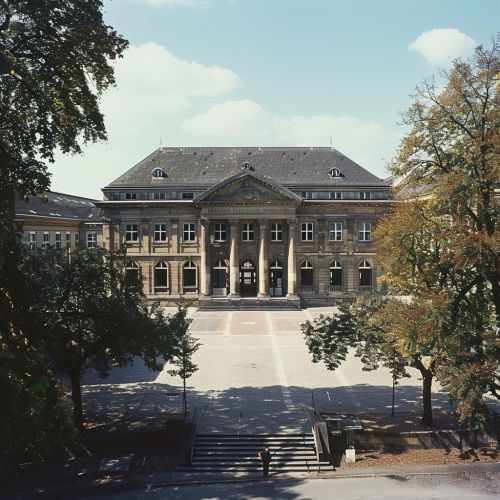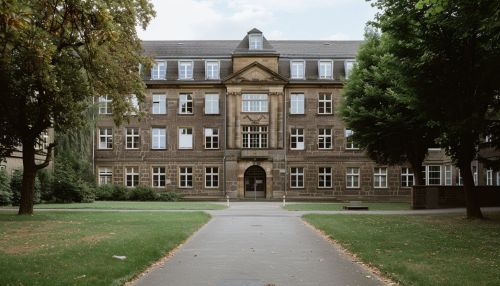Jürgen Habermas: Difference between revisions
No edit summary |
No edit summary |
||
| Line 4: | Line 4: | ||
In 1949, Habermas began his studies at the University of Göttingen, where he studied philosophy and sociology. He then transferred to the University of Bonn, where he completed his doctoral thesis on the conflict between the absolute and history in Schelling's thought. His thesis was supervised by the renowned philosopher and sociologist, [[Theodor Adorno|Theodor W. Adorno]]. | In 1949, Habermas began his studies at the University of Göttingen, where he studied philosophy and sociology. He then transferred to the University of Bonn, where he completed his doctoral thesis on the conflict between the absolute and history in Schelling's thought. His thesis was supervised by the renowned philosopher and sociologist, [[Theodor Adorno|Theodor W. Adorno]]. | ||
[[Image:Detail-77805.jpg|thumb|center|A photograph of the main building of the University of Bonn, where Habermas completed his doctoral studies.]] | [[Image:Detail-77805.jpg|thumb|center|A photograph of the main building of the University of Bonn, where Habermas completed his doctoral studies.|class=only_on_mobile]] | ||
[[Image:Detail-77806.jpg|thumb|center|A photograph of the main building of the University of Bonn, where Habermas completed his doctoral studies.|class=only_on_desktop]] | |||
== Career and Contributions to Philosophy == | == Career and Contributions to Philosophy == | ||
Latest revision as of 21:16, 7 May 2024
Early Life and Education
Jürgen Habermas was born on June 18, 1929, in Düsseldorf, Germany. His father, Ernst Habermas, was a financial director and his mother, Grete Habermas, was a housewife. Habermas was raised in a middle-class family and was educated in the Gymnasium system of Germany, a type of secondary school that prepares students for higher education.
In 1949, Habermas began his studies at the University of Göttingen, where he studied philosophy and sociology. He then transferred to the University of Bonn, where he completed his doctoral thesis on the conflict between the absolute and history in Schelling's thought. His thesis was supervised by the renowned philosopher and sociologist, Theodor W. Adorno.


Career and Contributions to Philosophy
Habermas began his academic career as a lecturer at the University of Heidelberg in 1956. In 1961, he moved to the University of Frankfurt am Main, where he became a professor of philosophy and sociology. He remained at the University of Frankfurt until his retirement in 1994.
Habermas is best known for his work in the field of critical theory, a school of thought that seeks to critique society and culture by applying knowledge from the social sciences and the humanities. He is considered one of the leading figures of the second generation of the Frankfurt School, a group of social theorists associated with the Institute for Social Research in Frankfurt.
One of Habermas's most significant contributions to philosophy is his theory of communicative action, which he developed in his two-volume work, "The Theory of Communicative Action" (1981). In this work, Habermas argues that social action is primarily communicative, meaning that individuals coordinate their actions through communication. He also introduces the concept of the "lifeworld," which he defines as the background knowledge that individuals share and that forms the basis for their communication.
Habermas also made significant contributions to the field of political philosophy. In his book "Between Past and Future" (1985), he develops a theory of deliberative democracy, which emphasizes the importance of rational discussion and consensus in democratic decision-making.
Recognition and Awards
Over the course of his career, Habermas has received numerous awards and honors in recognition of his contributions to philosophy and sociology. In 1980, he was awarded the Sigmund Freud Prize for Scientific Prose by the German Academy for Language and Literature. In 2004, he received the Kyoto Prize in Arts and Philosophy, one of the most prestigious international awards for achievements in the humanities.
Personal Life
Habermas is married to Ute Wesselhoeft, a psychoanalyst. They have three children together. Despite his public profile, Habermas is known for his private nature and rarely gives interviews or appears in the media.
Legacy
Habermas's work has had a profound impact on a wide range of disciplines, including philosophy, sociology, political science, and communication studies. His theories of communicative action and deliberative democracy have been particularly influential and continue to be widely discussed and debated in academic circles.
